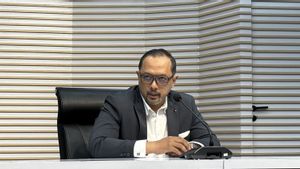BNPT Admits How Difficult It Is To Take Care Of The Deradicalization Of Ex-ISIS Citizens

JAKARTA - The government has not yet decided to repatriate around 600 former ISIS Indonesian citizens who fled to the Middle East. However, if they are to be repatriated, they will receive deradicalisation.
Deradicalization is a strategy to neutralize ideas that are considered radical as ending in terrorism. This action was carried out with a gentle approach without repressive action.
Even so, the Head of the National Counterterrorism Agency (BNPT) Suhardi Alius admits that the deradicalization process for citizens exposed to radical ideology is not easy.
"In the deradicalization program as a whole, we are very dependent on the assistance of all ministries because BNPT cannot be alone. Imagine how difficult it is, how difficult it is to reduce and eliminate traumatic traumas," said Suhardi at the BNPT Office, Jalan Medan Merdeka Selatan, Central Jakarta, Friday, February 7th.
Since the program began in 2014, the BNPT has deradicalized 700 former terrorists. This program is voluntary. People who have been exposed to radicalism can get deradicalisation in the correctional institutions (prisons). If they don't want to, they can go home with monitoring from the BNPT.
The obstacles that BNPT have faced, continued Suhardi, are that not all of those in this prison also want deradicalisation.
"In fact, until they get out of prison, there are those who cannot get the deradicalisation program. People like this have the potential to commit acts of radicalization again," he said.
Meanwhile, another obstacle came from the refusal of several local governments in 107 prisons throughout Indonesia to place former terrorists.
"Sometimes, the local government asks 'Sir, don't put it here'. I wonder if I'm not there, where to put it? Our prisons are limited and have a high level of difficulty," he said.
Not to mention, the process of restoring the ideology of the former terrorists is also not easy. Suhardi gave an example, in 2017, there was a family of three generations who became former terrorists. Of course, the radical ideology in this family has taken root.
"Imagine, in Bambu Apus (prison), there were 3 generations from grandparents, fathers, mothers, to their grandchildren going there (Syria). Their change in mindset was truly extraordinary," explained Suhardi.
"Therefore, we also depend on others, such as Muhammadiyah, NU, other mass organizations, including psychologists. We can do without the help of the general public, including those we will deradicalize," he added.


